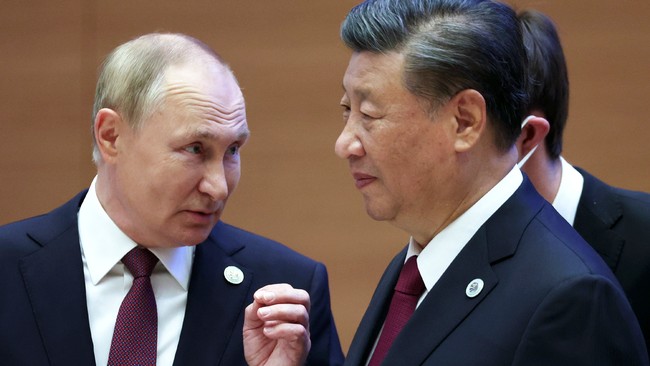
Have the Iranians already begun to ‘close’ the Strait of Hormuz? New reports from China — and an apparent sotto voce warning from Beijing to Tehran — suggest that the IRGC may have already deployed their opening salvo to render the strait impassable.
According to the Wall Street Journal, several commercial ships had to turn around after their navigation systems got jammed. That included two tankers servicing China’s insatiable energy appetite:
Half a dozen ships have diverted course on the way to the Strait of Hormuz, the crucial waterway connecting the energy-rich Persian Gulf to global markets since Sunday, according to shipping officials, analysts and marine-tracking data. Iranian lawmakers reportedly threatened its closure on Sunday.
Two Chinese-operated very large crude carriers went off course as they tried to enter the strait after their navigation systems were jammed as a result of military operations in Iran.
Coswisdom Lake, run by China’s Cosco Shipping Energy Transportation, and South Loyalty owned by Sinokor Merchant Marine, turned around as they sailed south of the Iranian Port of Bandar Abbas over the weekend. Later, the Coswisdom Lake and two other vessels U-turned again and are now heading back into Hormuz.
Navigational jamming would be one way to effectively ‘close’ the Strait of Hormuz, and the method with the least risk to the Iranian navy — assuming their vessels are not the source of the jamming. The problem with this method is that it will likely be easier to track back to its sources, and Israeli and American fighters can target and destroy the transmitters and whoever is operating them. The US Navy could still target Iranian naval vessels as a reprisal, but Trump will likely want to hold off on that unless absolutely necessary, as any wreckage could hinder shipping.
In fact, the Iranians could cut out the middleman and scuttle their naval vessels in the strait rather than wait for the Americans to do it for them. That might create a more targeted and longer-term impediment to shipping in the Persian Gulf and take a potential point of leverage off the table for Trump. That would be tantamount to cutting off your nose, eyes, and lips to spite your face, however, since the Iranians need to pass through the strait just as much as anyone else. They don’t have any reliable income stream except through oil sales, especially now that Israel has just destroyed most of their drone- and missile-production capacity … and what’s left will be necessary for Iranian operations rather than sale to Russia.
Much of their energy exports go to China, and they are not happy about the new developments in the Strait of Hormuz, emphasis mine:
The China Shipowners’ Association told its members in a statement to immediately start submitting daily reports on their ship movements through the Gulf of Oman and the Strait of Hormuz. Beijing also called on the international community to maintain stability in the critical shipping lanes of the Persian Gulf, and said it was in touch with Iran about the ongoing conflict.
That may be Beijing’s normally subtle method of signaling displeasure in public. The “China Shipowners Association” has to operate under the aegis of the Chinese Communist Party and the regime in Beijing, if not operating as a direct arm of the CCP. Being “in touch” after their shipping gets disrupted is not just going to be a “hi how are you” conversation with the regime.
China really needs that oil, but China’s not the only country in that position:
Around 84 percent of oil passing through the Strait of Hormuz is destined for Asia, leaving the economies of China, India, South Korea and others vulnerable should Iran blockade the crucial trading route over US strikes on its nuclear sites. …
China is one of the largest buyers, importing 5.4 million barrels of crude oil a day through Hormuz in the first quarter this year, according to the EIA.
Saudi Arabia is China’s second-largest supplier of crude oil, accounting for 15 percent of its total oil imports — 1.6 million barrels a day.
If Iran is scrambling navigation in the Persian Gulf, they’re not just cutting off their own noses, etc. They’re cutting off Beijing’s, and Xi Jinping is not going to put up with that for very long. Neither will India or South Korea. Iran will start running short on friends in the region if they cut off the few trading partners they have.
That may be their last real card to play, however, although they may be using their shorter-range missiles to attack bases across the strait today. Or at least Qatar seems to think so:
Qatar has temporarily closed its airspace.
American citizens in Qatar have received an alert to shelter in place.
Officials warn that Iran could respond to the U.S. strikes over the weekend with an attack on American interests in Qatar.
— Trey Yingst (@TreyYingst) June 23, 2025
Dozens of flights have been diverted or grounded at Doha International Airport.
It’s serious. https://t.co/6unRszjP6N pic.twitter.com/QDLTe9V1NN
— Open Source Intel (@Osint613) June 23, 2025
Stay tuned. Either way, the Iranian navy is likely living on borrowed time, measured in days or perhaps hours.











